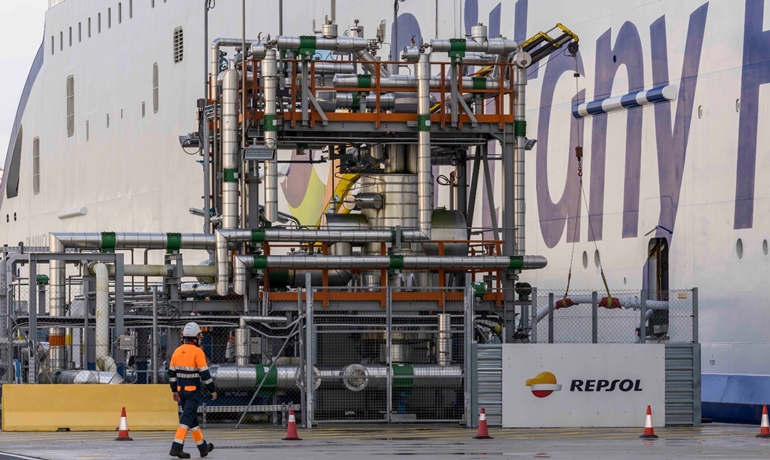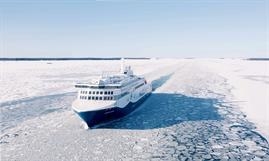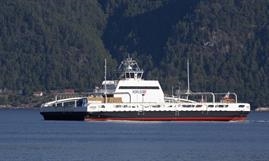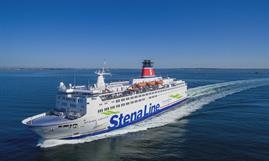
SALAMANCA LNG bunkering © Diario Montañes / Repsol
Repsol supplies bio-LNG to Brittany Ferries for the first time in Spain
FerryRepsol has started supplying liquefied biomethane (bio-LNG) to Brittany Ferries’ LNG-fuelled vessels SALAMANCA and SANTOÑA at the LNG-bunkering terminal in Santander (Spain). This is the first test of its kind for the two companies, consisting of the supply of three truckloads, totalling 60 tonnes of bio-LNG, and it is the first supply of its kind in Spain.
The collaboration between Repsol and Brittany Ferries highlights the firm commitment of both companies to the use of renewable fuels and the decarbonisation of the maritime industry.
The use of bioLNG can reduce the emissions of CO2 equivalent over 100% compared to the use of conventional LNG, depending on the feedstock to produce the biomethane. Additionally, the use of bio-LNG on board the ferries does not require any changes to the engines, and allows for the same performance of the vessels, as the bio-LNG has the same chemical composition as conventional LNG.
The fuel is produced at the first bio-LNG facility in Spain located in As Somozas in the northern Spanish region of Galicia. It is produced from waste from the agri-food industry, agriculture, and households, as well as sewage plant sludge.
“This test is the next significant step on Brittany Ferries journey to a more sustainable future,” explained Bertrand Crispils, head of energy transition, Brittany Ferries. “The first three truckloads of bio-LNG are the starting gun for Brittany Ferries to progressively substitute fossil fuels with greener alternatives. Combining the use of biofuels with other measures, such as electrification and efficient hydrodynamics, means we can fully mobilise in the battle to cut greenhouse gas emissions.”
Carlos Martin Iglesias LNG bunker trader at Repsol said, “With these first supplies of bio-LNG, we provide another option for the maritime sector to reduce the CO2 emissions from its activities. This trial is another proof of the commitment of Repsol to the energy transition and to supplying different energy alternatives to help its customers advance in their decarbonisation processes.”
This first supply of bioLNG follows significant investments that Brittany Ferries has made to have a more sustainable fleet of ships. Between 2019 and 2025, five new vessels will be joining the fleet, four of which will be powered by LNG. This includes two vessels already serving long-haul routes and two LNG-electric hybrids that are expected to arrive from the end of this year. Currently under construction, the hybrids will be ready for commercial services in the spring of 2025.
Renewable fuels are one of the key levers in Repsol’s decarbonisation strategy, as a complementary solution to electrification and renewable hydrogen that allows for immediate emissions reductions from all sectors of transport. Repsol aims to reach a total production capacity of renewable fuels, including biomethane and renewable hydrogen, of between 1.5 and 1.7 million tonnes in 2027 and up to 2.7 million in 2030, and to lead the market for this type of fuel for all sectors of transport in the Iberian Peninsula. With the start-up earlier this year of its new advanced biofuels plant in Cartagena, with an annual production capacity of 250,000 tonnes, the company is at the forefront of the industry in terms of renewable fuels production.
© Shippax
sep 25 2024





















